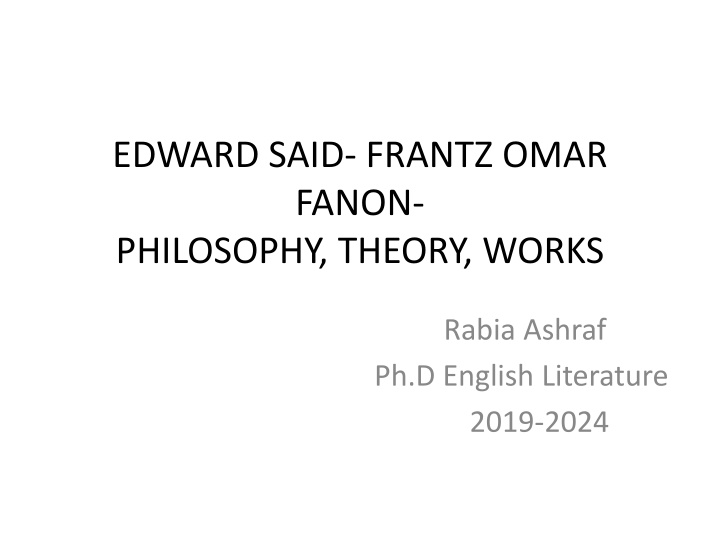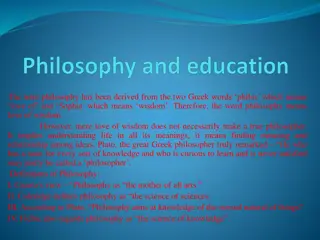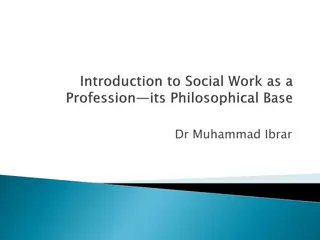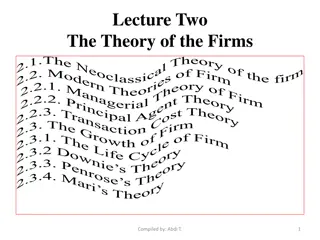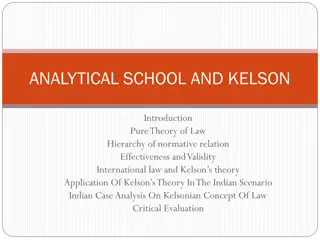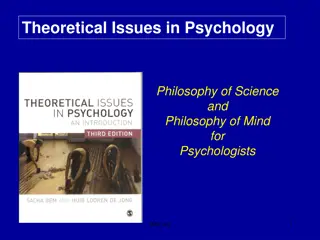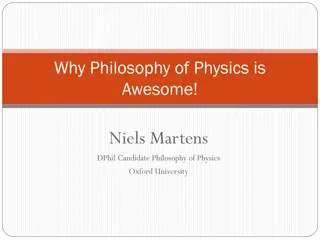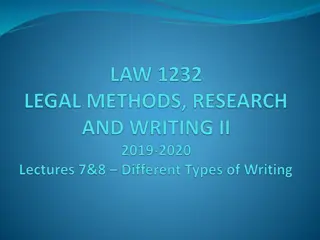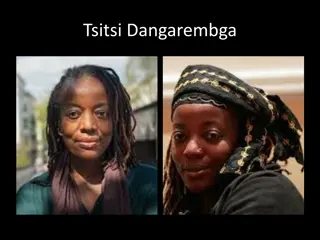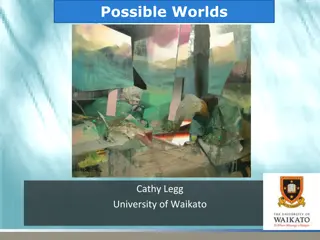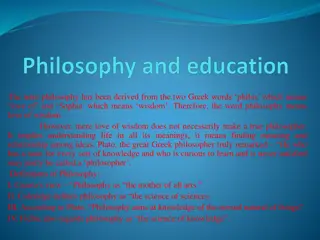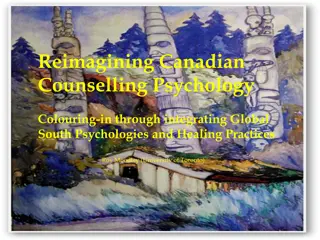Edward Said, Frantz Omar Fanon: Philosophy and Theory
Edward Said, a prominent figure in Middle Eastern studies, explored complex relationships between history, culture, politics, and academics. He challenged Western discourse through works like "Orientalism," sparking debate about power dynamics and identity. Said's insights on Palestine, nationalism, and colonialism remain influential, urging critical engagement with dominant narratives.
Download Presentation

Please find below an Image/Link to download the presentation.
The content on the website is provided AS IS for your information and personal use only. It may not be sold, licensed, or shared on other websites without obtaining consent from the author.If you encounter any issues during the download, it is possible that the publisher has removed the file from their server.
You are allowed to download the files provided on this website for personal or commercial use, subject to the condition that they are used lawfully. All files are the property of their respective owners.
The content on the website is provided AS IS for your information and personal use only. It may not be sold, licensed, or shared on other websites without obtaining consent from the author.
E N D
Presentation Transcript
EDWARD SAID- FRANTZ OMAR FANON- PHILOSOPHY, THEORY, WORKS Rabia Ashraf Ph.D English Literature 2019-2024
On July 3 2000, a photographer from Agence France-Presse, a French news agency, captured Said on film just before he reportedly hurled a rock over the Lebanon-Israeli wire fence border towards an Israeli watchtower while he was visiting the Lebanese border.
With an unexceptionally Arab family name like "Sad", connected to an improbably British first name (my mother much admired Edward VIII the Prince of Wales in 1935, the year of my birth) I was an uncomfortably anomalous student all through my early years: a Palestinian going to school in Egypt, with an English first name, an American passport, and no certain identity, at all. To make matters worse, Arabic, my native language, and English, my school language, were inextricably mixed: I have never known which was my first language, and have felt fully at home in neither, although I dream in both. Every time I speak an English sentence, I find myself echoing it in Arabic, and vice versa. Between Worlds, Reflections on Exile and Other Essays (2002) pp. 556 57
EDWARD SAID: VOICE OF PALESTINE He voiced Orient and Middle East. His works show complicated relation between HISTORY/CULTURE/POLITICS/ACADEMICS INTELLECTUALS SHOULD SPEAK THE TRUTH TO THE POWER- Gramsci (Organic Individuals) plunged into the specific history of the Palestinian liberation struggle. THE QUESTION OF PALESTINE- 1979 Said was regarded as the voice of violence and terrorism by many Westerners and Jews. Said s contentions about the nature of Western thought fail to provide an explanation for why his book has received so much attention and praise in the West. If the Western discourse on the Orient was so powerful and entrenched in culture then our powers of deduction say that Orientalism would have been exiled to the dustbin of history and that Said s career would be little more than that of an obscure scholar and political activist (David Zarnett 2007).
AN IDEOLOGY OF DIFFERENCE- 1985 Said calls Jews and ARABS two STATES. And Questions that CAN TWO STATES EXIST IN ONE TERRITORY? Does DIFFERENCE entail domination? TWO-STATE theory already entails separation- INSTITUTIONALIZATION of Difference. Said realized its LIMITATIONS. The politics of separation can t work in the Middle East , he said: The land s too small. Our history s so mixed. Why do nations like Israel have sustained immunity from criticism? Why is position of Jews in West special? (1) Changes like colonialism/ Israel s invasion of Arabs do not happen overnight dramatically. They are made up of complex, cumulative, contradictory processes occurring over a large period of time. No such process can be viewed neutrally. There are many interests at work (2) THERE IS NO SUCH THING AS PURE RACE, PURE NATION, PURE COLLECTIVITY REGARLESS OF PATRIOTIC, IDEOLOGICAL OR RELIGIOUS ARGUMENT. ALL MODERN STATES ARE COMPOSED OF MIXED POPULATIONS.
ORIENTALISM: WESTERN CONCEPTS OF THE ORIENT- 1978 Western scholarship had created an imaginary orient that masked the real Middle East/ East loaded with stereotypes. Questions CULTURAL REPRESENTATIONS OF ORIENT-TERRY EAGELTON THE MEANING OF RACE- Kenan Malik- 1994 Malik explained that Said had conflated the thinking of Enlightenment, which took universal humanity as its starting point with Romantic reaction against Enlightenment, which emphasized racial differences. If Said is a rationalist , is all rational thinking racist? Said analyses relations of KNOWLEDGE with POWER. FOUCAULDIAN? THESIS OF ORIENTALISM
Said on History and Ideology of Zionism Zionism and European colonialism- Robert Wistrich. There is an unmistakable coincidence between the experiences of Arab Palestinians at the hands of Zionism and the experiences of those black, yellow, and brown people who were described as inferior and subhuman by nineteenth-century imperialists." (Said- Zionism from the Standpoint of its Victims-1979). Eqbal Ahmad observed in his review in The Nation, Said was the first Palestinian of any consequence "to argue for the necessity of a full-scale political encounter between Jews and Palestinians Just as no Jew in the last hundred or so has been untouched by Zionism, so too no Palestinian has been unmarked by it." Said "Yet it must not be forgotten, that the Palestinian was not simply a function of Zionism. His life, culture and politics have their own dynamic and ultimately their own authenticity. (Said)
ON PALESTINIAN IDENTITY: A CONVERSATION WITH SALMAN RUSHDIE Said voices that history of East and West is a HISTORY OF EXTERNAL AND INTERNAL STRUGGLE. Rushdie comments on AFTER THE LAST SKY- CHAPTER ONE- titled-STATES It is a passionate and very moving meditation on displacement, on landlessness, on exile and identity. Said debates on the existence of Palestinians. Said writes from minority within minority - Rushdie
EXCERPT FROM AFTER THE LAST SKY Do we exist? What proof do we have? The further we get from the Palestine of our past, the more precarious our status, the more disrupted our being, the more intermittent our presence. When did we become a people? When did we stop being one? Or are we in the process of becoming one? What do those big questions have to do with our intimate relationships with each other and with others? We frequently end our letters with the motto Palestinian love or Palestinian kisses . Are there really such things as Palestinian intimacy and embraces, or are they simply intimacy and embraces experiences common to everyone, neither politically significant nor particular to a nation or a people?
TARIQ ALI- REMEMBERING EDWARD SAID Said argued for freedom from violence and from lies. The distortions and misrepresentations were systematic, part of a much larger system of thought that was endemic to the West s whole enterprise of dealing with the Arab World. CULTURE IS HOPLESSLESSLY INVOLVED IN POLITICS . (From a Conversation with Tariq Ali).
FANON AND HIS PSYCHOPATHOLOGY OF COLONIZATION Human, social and cultural consequences of colonization. Fanon's contributions to the history of ideas are manifold. He is influential not only because of the originality of his thought but also because of the astuteness of his criticisms. He developed a profound social existential analysis of antiblack racism, which led him to identify conditions of skewed rationality and reason in contemporary discourses on the human being. (What Fanon Said: A Philosophical Introduction To His Life And Thought, Lewis R. Gordon)
Black Skin, White Masks (1952), analysis of the negative psychological effects of colonial subjugation upon black people. DISALIENATION of a race How a Black NAVIGATES the world through PERFORMANCE of WHITE-NESS (Structures that produce white privilege). The NEGRO AND THE LANGUAGE- Chp1- He talks about how the black person's use of a colonizer's language is seen by the colonizer as predatory, and not transformative, which in turn may create insecurity in the black's consciousness (Lewis Gordon, WHAT FANON SAID). COLONIAL SUBJUGATION LEADS TO SELF- DIVISION. Historically, it must be understood that the Negro wants to speak French because it is the key that can open doors which were still barred to him fifty years ago (Fanon). BODILY-SCHEMA, HISTORICAL- RACIAL SCHEMA, EPIDERMAL BODILY SCHEMA
The Wretched of the Earth (1961) defends the right of colonized people to use violence to gain independence (THE BLACK PRINCE Movie 2017). delineated the processes and forces leading to national independence or neocolonialism during the decolonization movement that engulfed much of the world after World War II. Fanon argued that human beings who are not considered as such (by the colonizer) shall not be bound by principles that apply to humanity in their attitude towards the colonizer (censored by French government) he uses the Biblical metaphor, "The last shall be first, and the first, last- Relation with colonized and colonizer is that of binary opposites. Opposed CULTURAL ASSIMILATIONIST attitude (expelled from Algeria). TOWARDS THE AFRICAN REVOLUTION- Fanon reveals war tactical strategies; in one chapter he discusses how to open a southern front to war and how to run the supply lines. "The Jew" is simply an idea, but Blacks are feared for their physical attributes. Jewishness is not easily detectable to the naked eye, but race is.
A DYING COLONIALISM ALGERIAN REVOLUTION- people of Algeria embraced certain ancient cultural practices long derided by their colonialist oppressors as primitive, in order to destroy those oppressors. MILITANT touch having a gun is the only chance you still have of giving a meaning to your death. (Unveiled Algeria- An article from A Dying Colonialism). How people struggle to decolonize their MIND to avoid assimilation.
